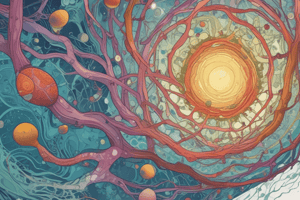Podcast
Questions and Answers
What is the main focus of the study of ecology in biology?
What is the main focus of the study of ecology in biology?
The study of interactions between organisms and their environment
What is the primary function of carbohydrates in living organisms?
What is the primary function of carbohydrates in living organisms?
Provide energy and structure
What is the role of the mitochondria in a cell?
What is the role of the mitochondria in a cell?
Generate energy for the cell
What is the process by which cells generate energy from glucose?
What is the process by which cells generate energy from glucose?
What is the site of protein synthesis in a cell?
What is the site of protein synthesis in a cell?
What is the study of the structure and function of biological molecules?
What is the study of the structure and function of biological molecules?
Flashcards are hidden until you start studying
Study Notes
Biology
Definition
- The study of living organisms and their interactions with each other and their environment
Branches of Biology
- Botany: study of plants
- Zoology: study of animals
- Microbiology: study of microorganisms
- Ecology: study of interactions between organisms and their environment
- Biochemistry: study of chemical processes in living organisms
- Molecular Biology: study of the structure and function of biological molecules
Biological Molecules
- Carbohydrates: provide energy and structure (e.g. sugars, starches)
- Proteins: perform a variety of functions (e.g. enzymes, hormones, structural proteins)
- Lipids: provide energy and structure (e.g. fats, oils)
- Nucleic Acids: contain genetic information (e.g. DNA, RNA)
Cell Structure
- Cell Membrane: regulates what enters and leaves the cell
- Cytoplasm: jelly-like substance inside the cell membrane
- Nucleus: contains genetic material (DNA)
- Mitochondria: generate energy for the cell
- Ribosomes: site of protein synthesis
Biological Processes
- Photosynthesis: process by which plants convert light energy into chemical energy
- Respiration: process by which cells generate energy from glucose
- Cell Division: process by which cells reproduce (e.g. mitosis, meiosis)
- Genetics: study of heredity and variation
Evolution
- Theory of Evolution: all living organisms share a common ancestor
- Natural Selection: process by which populations adapt to their environment
- Speciation: process by which new species emerge
Biological Systems
- Nervous System: controls and coordinates body functions
- Circulatory System: transports oxygen and nutrients to cells
- Immune System: defends against pathogens and diseases
- Digestive System: breaks down and absorbs nutrients from food
Studying That Suits You
Use AI to generate personalized quizzes and flashcards to suit your learning preferences.



